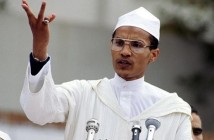WASHINGTON (AFP) – US President Barack Obama Thursday led a chorus of calls by world leaders for Syria’s president to step down, as the United Nations warned his regime could be guilty of crimes against humanity.
Obama also slapped harsh new sanctions on Syria, freezing state assets and blacklisting the oil and gas sector, in an escalation of pressure aimed at halting the regime’s bloody crackdown on protests.
It was the first explicit US call for Syrian President Bashar al-Assad to resign since the pro-democracy uprising — inspired by the revolts that toppled leaders in Egypt and Tunisia — erupted in mid-March.
Activists and the United Nations say more than 2,000 Syrians have been killed since then, as troops backed by tanks have assaulted several towns and cities.
Top UN officials told the Security Council that Syrian security forces shot dead 26 blindfolded men in a stadium and that a boy of 13 was feared killed in government custody, according to sources at the New York meeting.
“We have consistently said that President Assad must lead a democratic transition or get out of the way. He has not led. For the sake of the Syrian people, the time has come for President Assad to step aside,” Obama said.
His call was quickly echoed by French President Nicolas Sarkozy, German Chancellor Angela Merkel and British Prime Minister David Cameron.
“We call on him to face the reality of the complete rejection of his regime by the Syrian people and to step aside in the best interests of Syria and the unity of its people,” they said in a joint statement.
The European Union also joined the groundswell of calls for Assad to go, noting “the complete loss of Bashar al-Assad’s legitimacy.”
The US sanctions ban investment and most other economic activities in Syria as well as imports of Syrian oil and gas, which US Secretary of State Hillary Clinton said would “strike at the heart of the Syrian regime.”
UN High Commissioner for Human Rights Navi Pillay meanwhile said Syria may have committed crimes against humanity and urged the Security Council meeting on Thursday to refer the matter to the International Criminal Court.
A report by Pillay described “widespread or systematic attacks against the civilian population, which may amount to crimes against humanity.”
It said Syrian security forces had targeted civilians with ground forces, rooftop snipers and aircraft “with an apparent shoot-to-kill policy.”
The document also describes summary executions, including reports that “forces conducted regular raids in hospitals to search for and kill injured demonstrators,” as well as allegations of torture and arbitrary arrests.
It has been difficult to independently confirm events on the ground as Syria has heavily restricted media access since the start of the unrest.
The US State Department said that despite the new sanctions there were no plans to withdraw US ambassador to Syria Robert Ford, who it said was helping it to better understand the protestors.
Spokeswoman Victoria Nuland said the opposition has grown to include members of Syria’s major religious and ethnic groups and “even members of the military,” adding that it had a “new sense of energy.”
On Monday, the UN Human Rights Council is to hold a special session on Syria requested by 24 members, including four Arab members — Jordan, Kuwait, Qatar and Saudi Arabia.
The tide of international outrage came as Assad announced his security forces had ended their deadly crackdown, which his government has claimed is a response to an armed insurgency.
“It is strange that instead of offering (Damascus) a helping hand to implement its programme of reforms, the West and Obama are seeking to stoke more violence in Syria,” government spokeswoman Reem Haddad told AFP.
Activists in Syria confirmed that the situation was calm for the first time in weeks, but called for mass protests on Friday after Muslim prayers.
UN Secretary General Ban Ki-moon meanwhile spoke to Assad by telephone and expressed alarm at the violence, saying: “all military operations and mass arrests must cease immediately,” according to UN spokesman Farhan Haq.
Haq said Assad had told Ban that all military and police operations had been brought to a halt.
The head of the Britain-based Syrian Observatory for Human Rights, which is in touch with activists across the country, said the situation on the ground was calm on Thursday.
“I have not heard of any military action until now, apart from gunshots heard in (the port city of) Latakia,” Rami Abdel Rahman told AFP by telephone. “But the situation could change at any moment.”
Rights groups say 1,827 civilians and 416 security forces have been killed in Syria since the protests began earlier this year. A top UN official told the Security Council meeting Thursday that the civilian toll alone now topped 2,000.
http://nz.news.yahoo.com/a/-/world/10064295/western-leaders-urge-syrias-assad-to-quit/






